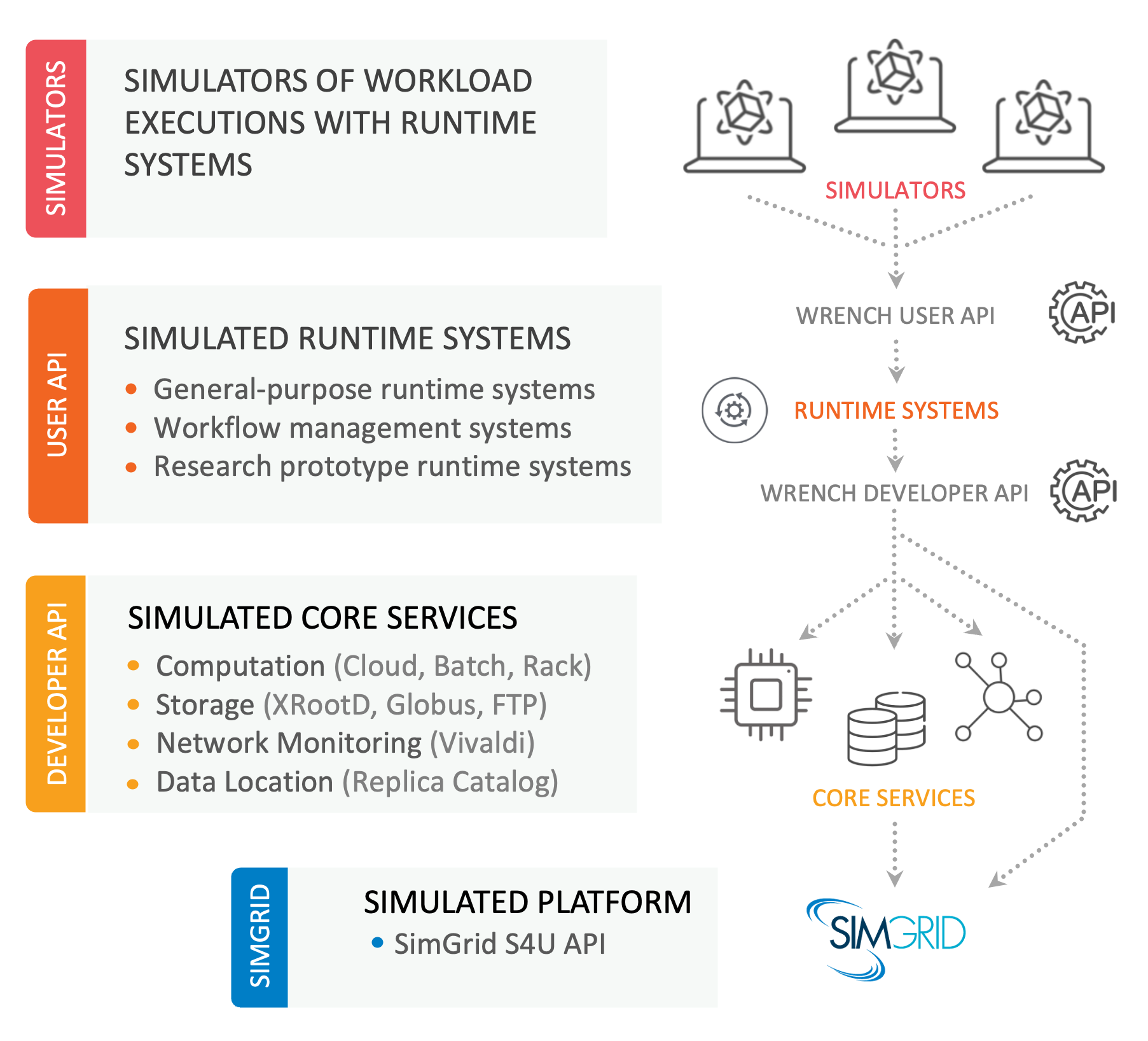THE WRENCH FRAMEWORK
A simulation workbench for modern cyberinfrastructure
WRENCH builds on SimGrid to deliver validated models, fast execution, and expressive scenario design. Prototype runtime systems, stress-test scheduling strategies, and explore platform behavior with confidence before deployment.
Capture platforms, workflows, and services with reusable abstractions.
Run large scenarios fast, with transparent performance signals.
Compare outcomes to production behavior and tune models.
MODULAR BUILDING BLOCKS
Compose CI services, runtime systems, and algorithms from reusable components.
VALIDATED MODELS
Anchor results in models that reflect observed system behavior.
SCALABLE RUNS
Simulate large scenarios quickly on a single workstation.
REPRODUCIBLE EXPERIMENTS
Share configurations and rerun experiments with consistent outcomes.
EDUCATION TOOLKIT
eduWRENCH delivers classroom-ready simulation modules from freshman to graduate levels.
RESEARCH PUBLICATIONS
Citing WRENCH & published work
Grab the official citation and browse papers authored by the WRENCH team.
BibTeX entry:
@article{wrench,
title = {Developing Accurate and Scalable Simulators of Production Workflow Management Systems with WRENCH},
author = {Casanova, Henri and Ferreira da Silva, Rafael and Tanaka, Ryan and Pandey, Suraj and Jethwani, Gautam and Koch, William and Albrecht, Spencer and Oeth, James and Suter, Fr\'{e}d\'{e}ric},
journal = {Future Generation Computer Systems},
volume = {112},
number = {},
pages = {162--175},
year = {2020},
doi = {10.1016/j.future.2020.05.030}
}
WRENCH Team Publications
Journals, conferences, workshops, and reports curated by the team.
On the Feasibility of Simulation-driven Portfolio Scheduling for Cyberinfrastructure Runtime Systems, H. Casanova, Y. C. Wong, L. Pottier, R. Ferreira da Silva, Workshop on Job Scheduling Strategies for Parallel Processing (JSSPP), 2022, doi: https://doi.org/10.1007/978-3-031-22698-4_1
Peachy Parallel Assignments (EduPar 2022), H. M. Bücker, H. Casanova, R. Ferreira da Silva, A. Lasserre, D. Luyen, R. Namyst, J. Schoder, P-A. Wacrenier, D. P. Bunde, 12th NSF/TCPP Workshop on Parallel and Distributed Computing Education (EduPar), 2022, doi: https://ieeexplore.ieee.org/document/9835532
Teaching Parallel and Distributed Computing Concepts in Simulation with WRENCH, H. Casanova, R. Tanaka, W. Koch, R. Ferreira da Silva, Journal of Parallel and Distributed Computing, 2021, doi: 10.1016/j.jpdc.2021.05.009
GLUME: A Strategy for Reducing Workflow Execution Times on Batch-Scheduled Platforms, E. Hataishi, P.-F. Dutot, R. Ferreira da Silva, H. Casanova, Workshop on Job Scheduling Strategies for Parallel Processing (JSSPP), 2021, doi: 10.1007/978-3-030-88224-2_11
Evaluating energy-aware scheduling algorithms for I/O-intensive scientific workflows, T. Coleman, H. Casanova, T. Gwartney, R. Ferreira da Silva, International Conference on Computational Science (ICCS), 2021, doi: 10.1007/978-3-030-77961-0_16
Peachy Parallel Assignments (EduHPC 2021), H. Casanova, R. Ferreira Da Silva, A. Gonzalez-Escribano, H. Li, Y. Torres, D. P. Bunde, 2021 IEEE/ACM Ninth Workshop on Education for High Performance Computing (EduHPC), doi: 10.1109/EduHPC54835.2021.00012
Emerging Frameworks for Advancing Scientific Workflows Research, Development, and Education, H. Casanova, E. Deelman, S. Gesing, M. Hildreth, S. Hudson, W. Koch, J. Larson, M.A. McDowell, N. Meyers, J.L. Navarro, G. Papadimitriou, R. Tanaka, I. Taylor, D. Thain, S.M. Wild, R. Filgueira, R. Ferreira da Silva, 2021 IEEE Workshop on Workflows in Support of Large-Scale Science (WORKS), doi: 10.1109/WORKS54523.2021
Peachy Parallel Assignments (EduHPC 2020), H. Casanova, R. Ferreira da Silva, A. Gonzalez-Escribano, W. Koch, Y. Torres, D. P. Bunde, 2020 IEEE/ACM Workshop on Education for High-Performance Computing (EduHPC), doi: 10.1109/EduHPC51895.2020.00012
WorkflowHub: Community Framework for Enabling Scientific Workflow Research and Development, R. Ferreira da Silva, L. Pottier, T. Coleman, E. Deelman, H. Casanova, 15th Workshop on Workflows in Support of Large-Scale Science (WORKS’20), 2020, doi: 10.1109/WORKS51914.2020.00012
Modeling the Performance of Scientific Workflow Executions on HPC Platforms with Burst Buffers, L. Pottier, R. Ferreira da Silva, H. Casanova, E. Deelman, IEEE Cluster, 2020, doi: 10.1109/CLUSTER49012.2020.00019
Developing Accurate and Scalable Simulators of Production Workflow Management Systems with WRENCH, H. Casanova, R. Ferreira da Silva, R. Tanaka, S. Pandey, G. Jethwani, W. Koch, S. Albrecht, J. Oeth, F. Suter, Future Generation Computer Systems, 2020, vol. 112, p. 162-175, doi: 10.1016/j.future.2020.05.030
Characterizing, Modeling, and Accurately Simulating Power and Energy Consumption of I/O-intensive Scientific Workflows, R. Ferreira da Silva, H. Casanova, A. Orgerie, R. Tanaka, E. Deelman, F. Suter, Journal of Computational Science, 2020, doi: 10.1016/j.jocs.2020.101157
Teaching Parallel and Distributed Computing Concepts in Simulation with WRENCH, R. Tanaka, R. Ferreira da Silva, H. Casanova, Workshop on Education for High-Performance Computing (EduHPC), 2019, doi: 10.1109/EduHPC49559.2019.00006
Bridging Concepts and Practice in eScience via Simulation-driven Engineering, R. Ferreira da Silva, H. Casanova, R. Tanaka, F. Suter, Workshop on Bridging from Concepts to Data and Computation for eScience (BC2DC’19), 15th International Conference on eScience (eScience), 2019, p. 609-614, doi: 10.1109/eScience.2019.00084
Accurately Simulating Energy Consumption of I/O-intensive Scientific Workflows, R. Ferreira da Silva, A-C. Orgerie, H. Casanova, R. Tanaka, E. Deelman, F. Suter, 2019 International Conference on Computational Science (ICCS), 2019, p. 138-152, doi: 10.1007/978-3-030-22734-0_11
WRENCH: A Framework for Simulating Workflow Management Systems, Casanova, H., Pandey, S. , Oeth, J., Tanaka, R., Suter, F., and Ferreira da Silva, R., 13th Workshop on Workflows in Support of Large-Scale Science (WORKS’18), 2018, p. 74–85, doi: 10.1109/WORKS.2018.00013
THEY USE WRENCH
Research Outcomes & Papers Using WRENCH
WRENCH has enabled research in 41 articles. Explore outcomes by year and browse the papers that rely on WRENCH across the workflows community.
Paper list
Scroll to browse publications that use WRENCH.
BottleMod: Modeling Data Flows and Tasks for Fast Bottleneck Analysis — A. Loßer, J. Witzke, F. Schintke, B. Scheuermann, 2025
Determining Levels of Detail for Simulators of Parallel and Distributed Computing Systems via Automated Calibration — J. McDonald, Y. Wong, K. Mehta, F. Suter, R. Ferreira da Silva, L. Pottier, E. Deelman, H. Casanova, 2025
Surrogate Modeling for Scalable Evaluation of Distributed Computing Systems for HEP Applications — L. Schmid, M. Horzela, V. Zhyla, M. Giffels, G. Quast, A. Koziolek, 2025
Automated Calibration of Parallel and Distributed Computing Simulators: A Case Study — J. McDonald, M. Horzela, F. Suter, H. Casanova, 2024
An exploration of online-simulation-driven portfolio scheduling in workflow management systems — J. McDonald, J. Dobbs, Y. C. Wong, R. Ferreira da Silva, H. Casanova, 2024
Automated Calibration of a Simulator of MPI Application Executions — Y. C. Wong, F. Suter, K. Mehta, H. Casanova, J. McDonald, 2024
Simulation of Large-Scale HPC Storage Systems: Challenges and Methodologies — J. Monniot, F. Tessier, H. Casanova, G. Antoniu, 2024
Automated Calibration of Parallel and Distributed Computing Simulators: A Case Study — J. McDonald, M. Horzela, F. Suter, H. Casanova, 2024
Modeling Distributed Computing Infrastructures for HEP Applications — M. Horzela, H. Casanova, M. Giffels, A. Gottmann, R. Hofsaess, G. Quast, S. R. Tisbeni, A. Streit, F. Suter, 2024
Precise makespan optimization via hybrid genetic algorithm for scientific workflow scheduling problem — P. Barredo, J. Puente, 2023
Modelling Distributed Heterogeneous Computing Infrastructures for HEP Applications — M. Horzela, H. Casanova, M. Giffels, A. Gottmann, R. Hofsaess, G. Quast, S. Rossi Tisbeni, A. Streit, F. Suter, 2023
Data-aware and simulation-driven planning of scientific workflows on IaaS clouds — T. N'Takpé, J. E. Gnimassoun, S. Oumtanaga, F. Suter, 2022
WfCommons: A Framework for Enabling Scientific Workflow Research and Development — T. Coleman, H. Casanova, L. Pottier, M. Kaushik, E. Deelman, R. Ferreira da Silva, 2022
Peachy Parallel Assignments (EduPar 2022) — H. M. Bücker, H. Casanova, R. Ferreira da Silva, A. Lasserre, D. Luyen, R. Namyst, J. Schoder, P-A. Wacrenier, D. P. Bunde, 2022
On the Feasibility of Simulation-driven Portfolio Scheduling for Cyberinfrastructure Runtime Systems — H. Casanova, Y. C. Wong, L. Pottier, R. Ferreira da Silva, 2022
Co-scheduling Ensembles of In Situ Workflows — T.M.A. Do, L. Pottier, R. Ferreira da Silva, F. Suter, S. Caino-Lores, M. Taufer, E. Deelman, 2022
BottleMod: Modeling Data Flows and Tasks for Fast Bottleneck Analysis — A. Losser, J. Witzke, F. Schintke, B. Scheuermann, 2022
Robust Makespan Optimization Via Genetic Algorithms On the Scientific Workflow Scheduling Problem — P. Barredo, J. Puente, 2022
Evaluating energy-aware scheduling algorithms for I/O-intensive scientific workflows — T. Coleman, H. Casanova, T. Gwartney, R. Ferreira da Silva, 2021
GLUME: A Strategy for Reducing Workflow Execution Times on Batch-Scheduled Platforms — E. Hataishi, P-F. Dutot, R. Ferreira da Silva, H. Casanova, 2021
Teaching Parallel and Distributed Computing Concepts in Simulation with WRENCH — H. Casanova, R. Tanaka, Koch, William, R. Ferreira da Silva, 2021
WfChef: Automated Generation of Accurate Scientific Workflow Generators — T. Coleman, H. Casanova, R. Ferreira da Silva, 2021
Modeling the Linux page cache for accurate simulation of data-intensive applications — H-D. Do, V. Hayot-Sasson, R. Ferreira da Silva, C. Steele, H. Casanova, T. Glatard, 2021
Modeling, Simulation, and Optimization of Variation-Aware Runtime-Reconfigurable Optical Interconnects — Y. Wang, 2021
Modeling the Linux Page Cache for Accurate Simulation of Data-Intensive Applications — H-D. Do, 2021
An Approach for Automating the Calibration of Simulations of Parallel and Distributed Computing Systems — W. Koch, 2021
Traffic-Adaptive Power Reconfiguration for Energy-Efficient and Energy-Proportional Optical Interconnects — Y. Wang, K. T. Cheng, 2021
Emerging Frameworks for Advancing Scientific Workflows Research, Development, and Education — H. Casanova, E. Deelman, S. Gesing, M. Hildreth, S. Hudson, W. Koch, J. Larson, M.A. McDowell, N. Meyers, J-L. Navarro, G. Papadimitriou, R. Tanaka, I. Taylor, D. Thain, S.M. Wild, R. Filgueira, R. Ferreira da Silva, 2021
Characterizing, Modeling, and Accurately Simulating Power and Energy Consumption of I/O-intensive Scientific Workflows — R. Ferreira da Silva, H. Casanova, A-C. Orgerie, R. Tanaka, E. Deelman, F. Suter, 2020
A Workflow Scheduling Algorithm for Reducing Data Transfers in Cloud IaaS — J. E. Gnimassoun, T. N'Takpe, G. H. F. Diedie, S. Oumtanaga, 2020
Efficient Execution of Scientific Workflows on Batch-Scheduled Clusters — E. Hataishi, 2020
Modeling the Performance of Scientific Workflow Executions on HPC Platforms with Burst Buffers — L. Pottier, R. Ferreira da Silva, H. Casanova, E. Deelman, 2020
WorkflowHub: Community Framework for Enabling Scientific Workflow Research and Development — R. Ferreira da Silva, L. Pottier, T. Coleman, E. Deelman, H. Casanova, 2020
Peachy Parallel Assignments (EduHPC 2020) — H. Casanova, R. Ferreira da Silva, A. Gonzalez-Escribano, W. Koch, Y. Torres, D. P. Bunde, 2020
Using Simple PID-inspired Controllers for Online Resilient Resource Management of Distributed Scientific Workflows — R. Ferreira da Silva, R. Filgueira, E. Deelman, E. Pairo-Castineira, I. M. Overton, M. Atkinson, 2019
Empowering Agroecosystem Modeling with HTC Scientific Workflows: The Cycles Model Use Case — R. Ferreira da Silva, R. Mayani, Y. Shi, A. R. Kemanian, M. Rynge, E. Deelman, 2019
Accurately Simulating Energy Consumption of I/O-intensive Scientific Workflows — R. Ferreira da Silva, A-C. Orgerie, H. Casanova, R. Tanaka, E. Deelman, F. Suter, 2019
Bridging Concepts and Practice in eScience via Simulation-driven Engineering — R. Ferreira da Silva, H. Casanova, R. Tanaka, F. Suter, 2019
Teaching Parallel and Distributed Computing Concepts in Simulation with WRENCH — R. Tanaka, R. Ferreira da Silva, H. Casanova, 2019
Scheduling Heuristics For Executing Scientific Workflows On Homogeneous Clusters With Globallyand Locally-Accessible Persistent Storage — S. Pandey, 2018
SMPI Courseware: Teaching Distributed-Memory Computing with MPI in Simulation — H. Casanova, A. Legrand, M. Quinson, F. Suter, 2018
WHO ARE WE?
ABOUT
Open-source, research-driven
WRENCH is an open-source framework distributed under the LGPLv3 license, built to enable reproducible, community-driven cyberinfrastructure research.
Core institutions: University of Hawai'i at Mãnoa (UHM) and Oak Ridge National Laboratory (ORNL).
Collaboration model: Researchers, educators, and developers advancing open simulation practices together.
Contributors
5 current collaborators · 14 alumni contributors.
Current team
-
 Henri Casanova Professor of Computer Science at the University of Hawai'i at Manoa, and member of the SimGrid team
Henri Casanova Professor of Computer Science at the University of Hawai'i at Manoa, and member of the SimGrid team -
 Rafael Ferreira da Silva Senior Research Scientist at the Oak Ridge National Laboratory
Rafael Ferreira da Silva Senior Research Scientist at the Oak Ridge National Laboratory -
 Frédéric Suter Senior Research Scientist at the Oak Ridge National Laboratory, and member of the SimGrid team
Frédéric Suter Senior Research Scientist at the Oak Ridge National Laboratory, and member of the SimGrid team -
 Jesse McDonald Computer Science PhD student at the University of Hawaii at Manoa
Jesse McDonald Computer Science PhD student at the University of Hawaii at Manoa -
 Loïc Pottier Research Scientist at the Lawrence Livermore National Laboratory
Loïc Pottier Research Scientist at the Lawrence Livermore National Laboratory
Previous contributors
-
 Derrick Luyen Computer Science Masters student at the University of Hawaii at Manoa
Derrick Luyen Computer Science Masters student at the University of Hawaii at Manoa -
 Tainã Coleman Computer Science PhD student at the University of Southern California
Tainã Coleman Computer Science PhD student at the University of Southern California -
 Jason Feuerstein Computer Science undergraduate student at University of Southern California
Jason Feuerstein Computer Science undergraduate student at University of Southern California -
 Gautam Jethwani Computer Science undergraduate student at University of Southern California
Gautam Jethwani Computer Science undergraduate student at University of Southern California -
 Evan Hataishi Computer Science Masters student at University of Hawaii at Manoa
Evan Hataishi Computer Science Masters student at University of Hawaii at Manoa -
 Ty Gwartney Computer Science and Maths Undergraduate Student at the University of Hawai`i at Manoa
Ty Gwartney Computer Science and Maths Undergraduate Student at the University of Hawai`i at Manoa -
 William Koch Computer Science Masters student at University of Hawaii at Manoa
William Koch Computer Science Masters student at University of Hawaii at Manoa -
 Ryan Tanaka Computer Science Masters student at University of Hawaii at Manoa
Ryan Tanaka Computer Science Masters student at University of Hawaii at Manoa -
 Vivian (Tongyu) Zhu Computer Science undergraduate student at University of Southern California
Vivian (Tongyu) Zhu Computer Science undergraduate student at University of Southern California -
 Suraj Pandey Computer Science Masters student at University of Hawaii at Manoa
Suraj Pandey Computer Science Masters student at University of Hawaii at Manoa -
 Tabitha See Ya Lee Computer Science undegraduate student at Vanderbilt University
Tabitha See Ya Lee Computer Science undegraduate student at Vanderbilt University -
 Samuel He Computer Science undergraduate student at University of Southern California
Samuel He Computer Science undergraduate student at University of Southern California -
 Spencer Albrecht Computer Science undergraduate student at University of Southern California
Spencer Albrecht Computer Science undergraduate student at University of Southern California -
 James Oeth Computer Science undergraduate student at University of Southern California
James Oeth Computer Science undergraduate student at University of Southern California
DEV'S CORNER
Everything you need to build, test, and collaborate
Source code lives on GitHub. Report bugs or request features via the Issues tracker.
Join the WRENCH Slack
Collaborate with the community, share experiences, and get support in real time.
Join the workspaceWorkflow traces + generators
Access workflow assets via WfCommons to feed WRENCH simulators.
Explore WfCommonsLatest unstable build
Grab the freshest features and performance updates (with the usual experimental caveats).
git clone https://github.com/wrench-project/wrench.git

